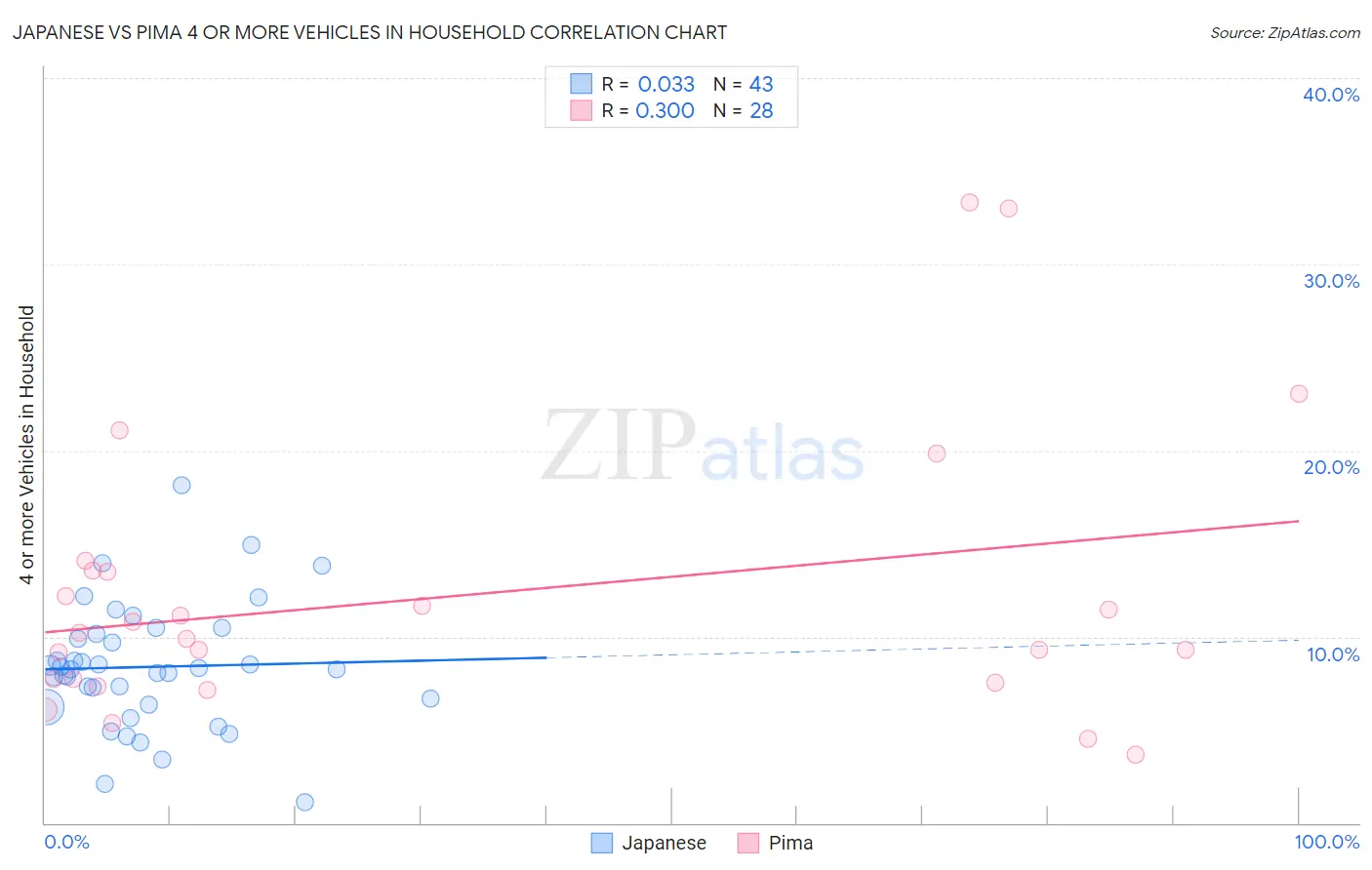Japanese vs Pima 4 or more Vehicles in Household
COMPARE
Japanese
Pima
4 or more Vehicles in Household
4 or more Vehicles in Household Comparison
Japanese
Pima
7.7%
4 OR MORE VEHICLES IN HOUSEHOLD
100.0/ 100
METRIC RATING
52nd/ 347
METRIC RANK
7.9%
4 OR MORE VEHICLES IN HOUSEHOLD
100.0/ 100
METRIC RATING
41st/ 347
METRIC RANK
Japanese vs Pima 4 or more Vehicles in Household Correlation Chart
The statistical analysis conducted on geographies consisting of 248,680,016 people shows no correlation between the proportion of Japanese and percentage of households with 4 or more vehicles available in the United States with a correlation coefficient (R) of 0.033 and weighted average of 7.7%. Similarly, the statistical analysis conducted on geographies consisting of 61,524,905 people shows a weak positive correlation between the proportion of Pima and percentage of households with 4 or more vehicles available in the United States with a correlation coefficient (R) of 0.300 and weighted average of 7.9%, a difference of 2.3%.

4 or more Vehicles in Household Correlation Summary
| Measurement | Japanese | Pima |
| Minimum | 1.1% | 3.7% |
| Maximum | 18.1% | 33.3% |
| Range | 17.0% | 29.7% |
| Mean | 8.4% | 12.2% |
| Median | 8.3% | 10.0% |
| Interquartile 25% (IQ1) | 6.3% | 7.6% |
| Interquartile 75% (IQ3) | 10.1% | 13.5% |
| Interquartile Range (IQR) | 3.8% | 5.9% |
| Standard Deviation (Sample) | 3.3% | 7.5% |
| Standard Deviation (Population) | 3.3% | 7.4% |
Demographics Similar to Japanese and Pima by 4 or more Vehicles in Household
In terms of 4 or more vehicles in household, the demographic groups most similar to Japanese are Immigrants from Laos (7.7%, a difference of 0.12%), Malaysian (7.7%, a difference of 0.38%), Dutch (7.7%, a difference of 0.46%), Immigrants from El Salvador (7.7%, a difference of 0.47%), and Cherokee (7.7%, a difference of 0.63%). Similarly, the demographic groups most similar to Pima are Salvadoran (7.8%, a difference of 0.49%), Spanish (7.9%, a difference of 0.57%), Fijian (7.8%, a difference of 0.60%), Bhutanese (7.8%, a difference of 0.86%), and Choctaw (7.8%, a difference of 0.92%).
| Demographics | Rating | Rank | 4 or more Vehicles in Household |
| Norwegians | 100.0 /100 | #36 | Exceptional 8.0% |
| Scandinavians | 100.0 /100 | #37 | Exceptional 8.0% |
| Sioux | 100.0 /100 | #38 | Exceptional 8.0% |
| Spanish Americans | 100.0 /100 | #39 | Exceptional 8.0% |
| Spanish | 100.0 /100 | #40 | Exceptional 7.9% |
| Pima | 100.0 /100 | #41 | Exceptional 7.9% |
| Salvadorans | 100.0 /100 | #42 | Exceptional 7.8% |
| Fijians | 100.0 /100 | #43 | Exceptional 7.8% |
| Bhutanese | 100.0 /100 | #44 | Exceptional 7.8% |
| Choctaw | 100.0 /100 | #45 | Exceptional 7.8% |
| Crow | 100.0 /100 | #46 | Exceptional 7.8% |
| Osage | 100.0 /100 | #47 | Exceptional 7.8% |
| Swiss | 100.0 /100 | #48 | Exceptional 7.8% |
| Cherokee | 100.0 /100 | #49 | Exceptional 7.7% |
| Immigrants | El Salvador | 100.0 /100 | #50 | Exceptional 7.7% |
| Immigrants | Laos | 100.0 /100 | #51 | Exceptional 7.7% |
| Japanese | 100.0 /100 | #52 | Exceptional 7.7% |
| Malaysians | 100.0 /100 | #53 | Exceptional 7.7% |
| Dutch | 100.0 /100 | #54 | Exceptional 7.7% |
| Immigrants | Oceania | 100.0 /100 | #55 | Exceptional 7.6% |
| English | 100.0 /100 | #56 | Exceptional 7.6% |